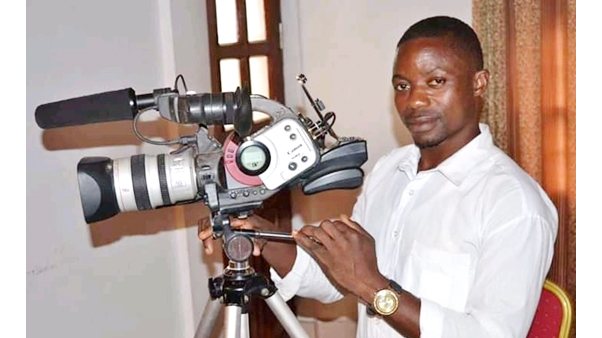By Hope Nda
One year since Government announced that Buea-based television journalist, Samuel Ajiekah Abuwe, (Samuel Wazizi) had died in detention, the Cameroonian population and the international community have not seen the late journalist’s body.
Owing to widespread condemnation of Wazizi’s death, President Paul Biya promised to personally investigate the case but findings are still being awaited.
In Buea, journalists have expressed disappointment at the Cameroon justice system for “robbing” them of justice for their colleague who had spent close to a year in detention before the Government announced, June 5, 2020, that he had died of Sepsis.
The Post talked with Isidore Abah, President of the Buea Chapter of Cameroon Association of English-speaking Journalists, CAMASEJ, who said the Government’s “refusal” of justice for Wazizi shows the journalist’s killing was deliberate and was ”ordered from above”.
“We are embarrassed,” says Abah. “When Government said they were going to investigate and the perpetrators brought to book, we were elated that, for once, justice will be served, given the circumstances under which Wazizi was arrested, detained and killed. We think that the only way for the Government to have honoured the memory of Wazizi was to bring the culprits to book so that they could face the arm of the law. This is a testament to a government that has lost its vision.
“When you rob people of justice, there is no need for those people to believe in the institution of the state. I think it is a recurrent situation in Cameroon where, when things of national importance occur, Government says we will investigate into it and then we are going to bring the culprits to book. A better way of saying that we are not going to do anything is that we are going to investigate; going by the way the government is treating this issue.
“We think that we have waited for one year and nothing has been done. So it has forced us to believe that the killing of Wazizi was deliberate, it was ordered from above – because he was speaking the truth – and that we sympathise with the family… So when it takes over two years for people to even see the corpse of their person while the family is being intimidated, I think it is a travesty to justice,” Abah told The Post.
On June 5, 2020, President Paul Biya promised to investigate the cause of Wazizi’s death following the ministry of justice’s announcement that he had died of Sepsis while in detention.
Military spokesperson, Col Cyrille Atongfack, later stated that his body had been sealed and would only be released after investigations have been concluded on the case.
But media practitioners, including the President of the National Trade Union of Cameroon Journalists, Denis Kwebo, viewed the Government’s months of silence over Wazizi’s whereabouts and the refusal to hand over his body as a clear cover-up.
Before being pronounced dead, Samuel Wazizi had spent 10 months in incommunicado detention after police officers arrested him on 2 August 2019, at Muea, Buea, on charges of collaboration with separatist fighters, claims which he had rejected.
But one year after the President’s investigation promise, nothing has yet been said on the outcome of these investigations and Wazizi’s body is yet to be handed over to his family.
“Enough is enough. We think that the life of every Cameroonian should matter. People should not bring in their issues and then come under the guise of fighting the Anglophone Crisis to kill people the way they have done. We think that if we are in a state of law, then justice delayed is justice denied and we think that the case of Wazizi should be taken into consideration,” CAMASEJ’s Isidore Abah added.
Critical observers of President Paul Biya’s Government say press freedom in Cameroon is still nightmarish as journalists who want to play the watchdog role of the media get frustrated with impunity, or are killed without mercy.
Several Cameroonian journalists have had to pay the price of being too daring. One of them is Emmanuel Mbombog Mbog Matip, Publication Director of Climat Social newspaper, who spent more than six months in pre-trial detention after his arrest on August 17, 2020, by Cameroon’s security and defence forces.
Also, outspoken online journalist, Paul Chouta, spent close to two years in pre-trial detention following his arrest in May 2019, under charges of defamation and false information. He was only released in May this year.

3 comments
Thanks for sharing. I read many of your blog posts, cool, your blog is very good.
I don’t think the title of your article matches the content lol. Just kidding, mainly because I had some doubts after reading the article.
I don’t think the title of your article matches the content lol. Just kidding, mainly because I had some doubts after reading the article.